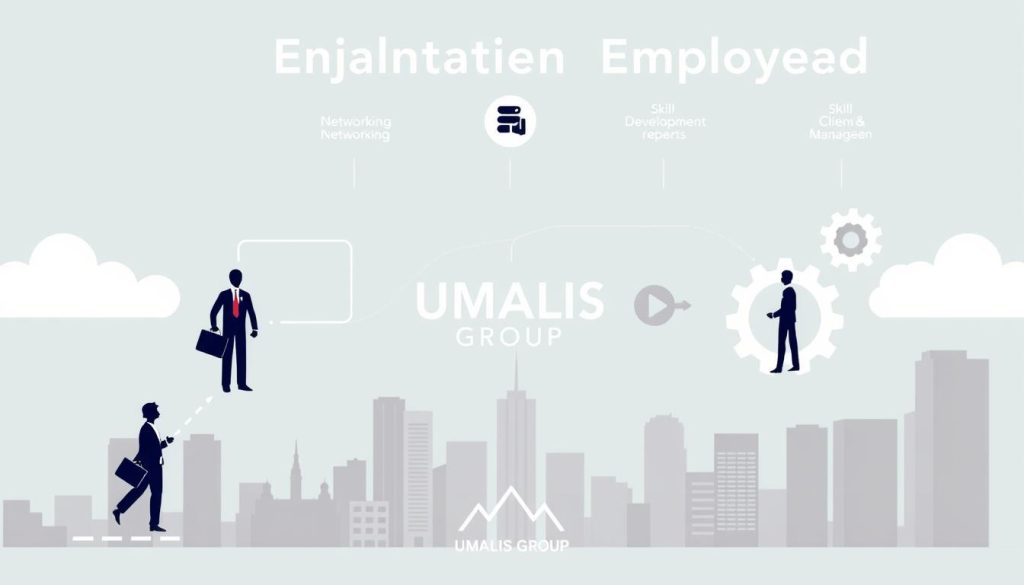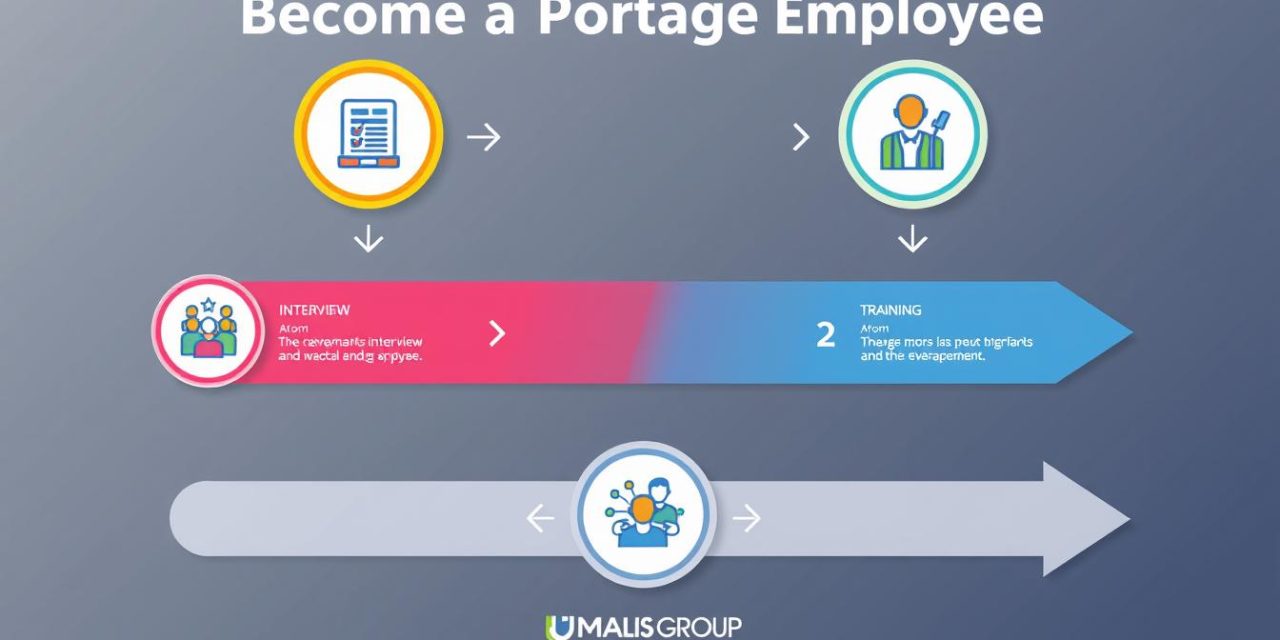Starting your journey as a portage employee brings many perks. It combines freelancing’s freedom with the stability of a regular job. This guide will show you the key démarches pour devenir salarié porté. It helps you find your way in this special work setting.
Entering this field is simpler than you might think. By following these crucial steps to become a salarié porté, you can begin your new career quickly. You could start in just 2-5 days instead of six months. Plus, you’ll save a lot on admin costs. This guide makes the whole process easier. It puts you on track for an exciting career as a portage employee.
Table of Contents
Key Takeaways
- Understand the unique benefits of being part of the portage salarial system.
- Recognize the swift market entry and cost-effective nature of becoming a portage employee.
- Learn how portage employment can significantly reduce administrative strain and associated costs.
- Decrease employee turnover and enhance company growth by embracing portage salarial.
- Acknowledge the high level of satisfaction among current PEO clients, paving the way for your success.
What is Portage Employment?
In today’s job world, portage employment is a unique choice for freelancers in France. It lets a person work on their own but still be employed by a portage company. This way, they get the best of both worlds.
Definition of Portage Employment
Portage employment connects a freelancer, their client, and a portage company in a special way. A freelancer handles their work and clients. Yet, the portage company takes care of things like payroll and laws. To start, you sign up with a certified portage company.
Benefits of Being a Portage Employee
There are many perks for salarié porté employees. They enjoy job security, social benefits, and can even get unemployment insurance. This is different from regular freelance work.
This model also boosts a freelancer’s image and helps win over clients. Plus, it offers a stable paycheck each month. And, you can earn more based on your work output.
| Category | Minimum Monthly Gross Income (€) | Comments |
|---|---|---|
| Junior Portage Employee (outside day-rate schemes) | 2,288.30 | Receives 70% of the standard hourly social security ceiling |
| Senior Portage Employee (outside day-rate schemes) | 2,451.75 | Touches 75% of the hourly ceiling |
| Portage Employee on Day-rate Schemes | 2,778.65 | Receives 85% of the standard ceiling |
Portage employment gives a full package of benefits. It also offers help as you move through your career. This makes it an appealing choice for people new to freelancing or seeking new paths.
Who Can Become a Portage Employee?
Figuring out who benefits from being a salarié porté is key. This part talks about who is eligible and the kinds of jobs that fit well with portage employment.
Eligibility Criteria
To qualify as a salarié porté, you need a professional qualification at level 5. This is like having a two-year college degree. Or you should have at least three years of experience in your field. This makes sure you have the skills to offer top-notch services.
Becoming a salarié porté also often means joining a professional group. This proves you follow the rules and ethics of your industry.
Types of Professionals Welcome
Different professionals like the portage salarial system. Especially those in consulting, IT, design, and translation. These areas usually have project-based work, so the portage system’s flexibility is perfect.
| Professional Field | Percentage of Portage Employees | Typical Qualification Level |
|---|---|---|
| IT Professionals | 30% | Master’s Degree |
| Consultants | 25% | Bachelor’s Degree or Higher |
| Designers | 20% | Professional Diploma |
| Translators | 25% | Bachelor’s Degree or Professional Certification |
This framework isn’t just for these areas. However, these stats show common backgrounds of people choosing this job model. No matter if you’re an expert consultant or a fresh IT grad, getting to know the salarié porté criteria is the first step. It helps you start a successful freelance career in a new and innovative way.
How Does Portage Employment Work?
Understanding portage employment is crucial for freelancers. It’s key if you’re learning how to become a salarié porté or looking for a démarches pour devenir salarié porté guide. This work style links the freelancer, client, and portage company. We will unpack their roles and duties in this setup.
Understanding the Portage System
The portage employment framework is vital. It lets freelancers work like employees while staying independent. It became part of the Code du Travail in 2008. The model has grown fast, going from €68 million to €1.9 billion in revenue from a decade ago to 2022.
- The model is based on a three-way agreement. The portage company is the official employer. It manages payroll and follows legal rules.
- Freelancers in this setup can focus on their work. They get stability and support from the portage company.
- There have been efforts to update legal rules. This makes the model more appealing.
Role of the Portage Company
The portage company is key to this arrangement’s success. It connects freelancers with clients. It also ensures everyone follows contracts and laws.
- These companies handle billing and payments. This lets freelancers avoid the complex finance tasks of running a business.
- Freelancers get benefits similar to regular employees. This is thanks to the portage company.
- The sector has grown 40% each year for three years. By 2023, it will include 200,000 freelancers. This highlights the increasing importance of portage companies.
Portage companies also help with problem-solving and mediation. They often provide a full package of services. This boosts the professional life of freelancers.
In summary, portage employment is a beneficial system for all involved. As the sector is expected to grow by 500,000 jobs by 2025, understanding the key role of portage companies is crucial. Both freelancers and firms can gain from knowing how these operations work.
Steps to Get Started
Getting started as a salarié porté means choosing the right portage company carefully. This is key to begin your career with clearness and assurance. In this part, you’ll learn how to research, compare, and find the perfect company for your needs.
Research Portage Companies
Starting out as a salarié porté requires digging deep into research. First, check if the company is real by looking for its registration like RCS Paris 890 521 172. Picking a company that’s always there for you, day and night, is critical.
Compare Services Offered
The next important step is to see what each company offers. Explore their services like project tools, support help, and chances to network. You need to focus on what benefits each company brings to support your freelance work.
Evaluate Costs and Fees
Understanding and comparing costs is a must. Think about the fees, as they greatly impact your choice. Below, you’ll find a comparison table to help judge costs and services together.
| Feature | Company A | Company B |
|---|---|---|
| 24/7 Access | Available | Available |
| Registration Requirement | One-time | One-time |
| Account Deletion Post-Request | Immediately | 24 hours |
| Hyperlink Policy | Non-commercial | Any with approval |
| Support Contact | 05 53 54 02 40 | 05 53 54 02 40 |
To wrap up your research, these steps guide you in creating a promising contract environment for your career. Moving forward, carefully examine these areas to lay a solid foundation for your new professional role as a salarié porté.
Preparing Your Portfolio
As a portage employee, making a great portfolio is key. It shows your skills and builds your professional image in the salarié porté process. Including your top work and achievements helps showcase your career and abilities. This is vital for drawing in clients and portage companies.
What to Include in Your Portfolio
- Relevant project examples: Add various projects to show your skills and how you tackle different situations.
- Certifications and Awards: Boost your portfolio’s trustworthiness with certifications, courses, and any awards you’ve earned.
- Testimonials and references: Positive feedback from past bosses or clients proves your work’s quality and dependability.
Presenting Your Skills Effectively
Having a good portfolio is crucial, but how you present it also matters. You need to stand out in the busy salarié porté marketplace. Here are tips:
- Organize clearly: Sort your portfolio by skill type, industry, or time to make it easy to look through.
- Use high-quality visuals: Add clear, professionally presented images or links to your work. Visuals grab attention and keep people interested.
- Keep it updated: Constantly adding new projects or skills keeps your portfolio current and relevant.
Following these guidelines will boost your market appeal as a portage employee. It’s not just about gathering your past work. It’s also about showing what you can do in the future.
Preparation and strategy in your portfolio can really make a difference. It becomes a key asset for getting new roles and moving your career forward as a portage employee. Adding each project highlights your knowledge and your dedication to growing professionally and excelling in your area.
Registering with a Portage Company
Getting started in portage employment means signing up with a trustworthy portage company. It’s the first big step. You need to gather specific documents and understand how to apply. This is key for becoming a démarches pour devenir salarié porté.
Required Documentation
For a successful salarié porté registration, it’s important to provide accurate and detailed paperwork. You should prepare things like proof of your skills, an in-depth resume, and any certificates you have. These papers prove your abilities and help the portage company support you better.
Application Process Overview
Understanding the application steps is crucial when moving into portage work. Start by picking a good portage company. A helpful tip is to use comparative analysis of portage companies for selection. Then, you’ll fill in an application form. Discussions on work terms and projects follow. Lastly, you’ll receive contracts detailing your work scope, pay, and benefits.
Here’s what you generally face in the salarié porté signup process:
- Documentation Submission: Ensure you hand in all the needed personal and professional documents as the portage company requests.
- Initial Consultation: Have a meeting to talk about what you offer professionally, your goals, and project details.
- Contract Agreement: Go over and sign the contracts about your job and projects. This marks your beginning as a salarié porté.
This process aims at clear and agreed terms for your portage work journey. Being ready and knowing these démarches pour devenir salarié porté sets you up for success.
Understanding the Contract
Going deeper into the salarié porté process means really getting the contract. It’s not just paperwork. This document is key. It shows your rights and duties. It connects you with the portage company and the client.
Key Elements of a Portage Contract
The portage contract stands out, offering both flexibility and security. It details your job, the project’s length, and what you’re responsible for.
The contract must also follow the Code du travail‘s rules on portage salarial. It sets minimum pay at 2517,13€, including extras like holiday pay and a 5% bonus, making sure your work pays off.
Negotiating Terms and Conditions
Negotiation is key to making the most of being a salarié porté. You have the power to shape the contract. It should reflect your value and what you need professionally.
Focus on pay, how long the job is, and the type of contract. You could have a fixed-term contract or a permanent one, which helps with getting loans for big projects. This is your chance to make the terms work for you.
Setting Your Salary
Learning how to set your salary as a salarié porté is key. It helps you make the most of this unique job style. Knowing how to discuss pay wisely is important.
Factors Influencing Salary
Many things affect how much you make. What the job usually pays, your own experience, and the job’s demands matter. Today’s work world, loved by younger workers, shows how pay should match career goals and personal growth.
Discussing Compensation with Your Portage Company
Talking honestly with your portage company about pay is vital. Understanding the benefits of being a salarié porté helps. You want your pay to show your worth and fit market rates. When negotiating, think about these points:
- Understand the Market: Know the standard rates in your field. For example, real estate often has charges around 5% plus VAT.
- Value Your Experience: Talk up your experience and special skills.
- Project Specifications: Share details about the project’s scope, deadlines, and what you need to deliver.
- Contract Clarity: Make sure all details about fees and responsibilities are clear to avoid issues.
Having these talks with your portage company helps align your pay expectations with reality. This leads to a more satisfying work life.
| Consideration | Description | Impact on Salary Decision |
|---|---|---|
| Professional Experience | Years and depth of relevant job experience | Higher experience can leverage better pay |
| Industry Standards | Typical pay and benefits in the sector | Vital for benchmarking salary expectations |
| Project Complexity | Degree of difficulty and skills required | More complex projects may warrant higher compensation |
Taking a thorough look at these factors helps in talks with your portage company. It ensures fair pay that reflects your value and encourages you to stay. Fully knowing the benefits of being a salarié porté leads to successful negotiations.
Managing Clients

Using the démarches pour devenir salarié porté strategy, it’s important to understand client management. You must secure your first contracts and keep a good relationship ongoing. The benefits of salarié porté, like flexibility and legal security, help you. They let you focus on delivering quality work and growing client relationships.
Finding Your First Clients
Starting with portage salarial might seem tough. But having access to a unique network and partnerships helps you find your first clients. Highlighting the benefits, such as professionalism and quality assurance with the PEPS label, sets you apart from regular freelancers.
Building Client Relationships
After finding clients, the next goal is to keep them. This means talking regularly and always doing more than expected. The salarié porté strategy helps you here too. It includes using your portage company’s resources for training and getting better. This ensures you stay on top in fields like the social economy, agri-food, and higher education.
- Prompt Response: Always answer client questions quickly. It shows you care about their needs.
- Regular Updates: Keep clients in the loop about the progress. This builds trust and openness.
- Feedback Mechanism: Welcome and use feedback to make your services better and clients happier.
Lastly, using the salarié porté benefits is key in good client management. Focus on growing professionally and using your network through your portage company. This lays a strong foundation for a successful consulting career.
Taxes and Social Security
The salarié porté benefits have special tax duties and big social security perks. These perks are much like what regular jobs offer. We’ll look at the taxes and protections that come with salarié porté requirements.
Tax Obligations for Portage Employees
Portage employees must pay close attention to their taxes. The amount they need to make to qualify often links to 70% to 85% of what the social security allows. This range depends on how long they’ve been working. Knowing what you owe, after taking out allowable work costs, is key.
Benefits of Social Security Coverage
Salarié porté benefits provide big social security coverage. This includes things like unemployment pay, extra retirement funds, health care, CSG and CRDS, help with housing, and vacation pay. These benefits are part of their pay setup. So, even though they work independently, they get the same security as regular employees.
To learn more about salarié porté requirements and work-life perks, you can click here.
| Component | Percentage of Gross Income |
|---|---|
| Social Charges | About 40% |
| Management Fees | 5% to 10% |
| Net Salary from €5,000 Gross Revenue | €2,527 |
This data shows the pay structure for a portage worker. It highlights how big a part social security plays in their pay. Thus, it makes sure they have a strong financial and social safety net.
Maintaining Communication with the Portage Company
The evolving job world makes clear communication between a portage worker and their company key. For those learning how to become a salarié porté, knowing this helps manage work issues and contract details well.
Importance of Regular Updates
Regular talks keep both sides updated about work progress, promises, and pay. These check-ins build transparency and trust, vital for a good team in a salarié porté guide setting.
Resolving Issues Effectively
Direct contact helps solve problems fast, keeping work smooth. This keeps things professional in the portage world.
Look at practical ways to use these talk strategies:
| Scenario | Communication Strategy | Outcome |
|---|---|---|
| Document submission delay | Immediate notification and revised timeline discussion | Issue addressed without major project delays |
| Contract update requirement | Scheduled meeting to discuss and implement changes | Contract stays up-to-date |
| Discrepancy in payment | Clarification request and evidence submission | Problem solved quickly, trust stays strong |
Additionally, good communication helps in smooth operations. It’s vital for those serious about how to become a salarié porté. Every salarié porté guide highlights its role in successful portage jobs.
Continuous Professional Development
Today’s job market is always changing. The salarié porté process is about more than getting a job. It’s about growing in your career. Learning and growing professionally is key for workers in portage employment. This growth makes your skills better and boosts your career prospects.
About half of all workers feel stuck in their careers. This problem costs the UK 28 billion pounds every year. Yet, over 55% are trying to learn more to get past this stagnation. Ongoing learning is crucial for career progress and happiness.
Exploring Educational Opportunities
Staying current is essential in today’s competitive industry. With 48% of employers worried about not having enough skilled workers, ongoing learning is a must. Training programs help fill this skills gap. They give workers chances to move up and meet industry needs.
In the salarié porté process, France offers personal training accounts for up to 150 hours of learning. This shows a clear path to gaining new skills. Especially in fast-moving areas like IT and marketing, keeping up with new tech and methods is crucial for staying ahead.
Networking as a Portage Employee
Building connections in the portage world helps with salarié porté continuous growth. Networking leads to sharing knowledge, finding new work, and mentorship. Over a third of employees say learning from others is vital. Good networking can reveal new trends, job openings, and raise your profile.
Becoming a salarié porté is more than doing tasks. It’s about dedicating yourself to growing both personally and professionally. Through learning and networking, portage workers can greatly improve their skills. This makes them stand out in the ever-changing job market.
Challenges of Portage Employment
Portage employment has its perks but also presents unique challenges. These difficulties can influence the journey of salarié porté. It’s key to know these challenges and learn how to overcome them. Doing so will make the portage work experience much better.
Common Issues Faced
- Securing consistent work: Due to the project-based nature of portage employment, maintaining a steady stream of clients can be daunting.
- Navigating administrative complexities: Despite the support from portage companies, the démarches pour devenir salarié porté issues often involve intricate compliance with tax and legal regulations.
- Client dependency: Sometimes, portage employees might face an over-reliance on a limited number of clients, which can be risky should those relationships end.
Strategies for Overcoming Challenges
- Networking and marketing: Regularly engaging in networking events and enhancing online presence can attract diverse clients and reduce dependency on few.
- Understanding legal frameworks: A salarié porté guide can assist in understanding the intricate legalities ensuring compliance and avoiding legal pitfalls.
- Contract diversification: To avoid client dependency, it’s wise to diversify the portfolio of contracts, which can also ensure regular work flow.
Leveraging the support from portage companies is key in overcoming these challenges. They provide administrative support and legal advice. Embracing these strategies addresses common issues. It boosts stability and success in portage employment.
Advantages of Portage Employment
Being a salarié porté brings big benefits. It makes careers more flexible and job satisfaction higher. This kind of job is becoming popular worldwide because of its many professional perks.
Flexibility and Autonomy
One of the top perks is the freedom and control you get. You can pick your projects and when to work, creating a good balance between work and life. This is especially great for IT people who work on many projects.
Plus, you can plan for retirement and get professional insurance. This is like traditional jobs but with added freedom and security.
Access to Professional Resources
Being a salarié porté means you get lots of resources. Portage companies help with paperwork, from billing to taxes. This lets you focus on your work and pleasing your clients. They also give you chances to learn new things to stay ahead in your field.
The model also promotes teamwork through workshops and meetings. This connects professionals for sharing tips and resources. For more insights on how this role helps with career growth, check out this detailed guide.
| Professional Aspect | Traditional Employment | Portage Employment |
|---|---|---|
| Job Flexibility | Limited | High |
| Administrative Obligations | Self-managed | Handled by Portage Company |
| Access to Training | Varies | Regular opportunities |
| Professional Networking | Dependent on personal effort | Facilitated by company |
| Financial Security | Stable but rigid | Flexible and secure |
This model doesn’t just meet the need for independence at work. It also offers a steady framework for both personal and professional growth.
Case Studies of Successful Portage Employees

Looking into the stories of those who’ve succeeded as salarié porté is inspiring. It gives us practical insights into démarches pour devenir salarié porté. We’ll focus on real-life examples. These show the strategies used and lessons learned.
Real-Life Success Stories
The path to success in portage salarial varies for everyone. Whether they’re freelance consultants or IT experts, each person’s story adds a unique viewpoint. Their skills, marketing, and communication have helped them grow professionally. They have also improved client happiness.
These examples share a common theme: they blend personal goals with the market’s needs. They stay flexible and professional. This not only grows their client list but also leads to long-term work and recommendations.
Lessons Learned from Their Experiences
A key lesson from these stories is the need to keep learning and adapting. Being up-to-date with your services or tech is crucial. It helps you stay relevant and successful as a portage employee. It’s also vital to understand money matters and legal details. This helps in earning more while staying within the law.
Teamwork with other freelancers and companies is also essential. Networking has opened new opportunities and improved their services. It highlights the importance of a good professional network.
| Aspect | Description | Impact |
|---|---|---|
| Continuous Adaptation | Regularly updating skills and services to meet market demands. | Increased market relevance and client retention. |
| Legal and Fiscal Awareness | Understanding the implications of different legal statuses and tax obligations. | Optimized earnings and compliance with regulations. |
| Strategic Networking | Collaborating with peers and industry leaders. | Enhanced service offerings and broader client base. |
The story of salarié porté success isn’t just about solo wins. It’s about how the portage salarial system grows and changes. Each tale underlines resilience and forward-thinking. They also highlight the different chances this unique job style offers.
Conclusion: Embracing Portage Employment
The path to success as a portage worker is full of chances for growth and freedom at work. The popularity of portage salarial has soared by 40% in three years in France. This shows a change in how people balance work and life, grow in their careers, and find happiness at work. In fact, 46% of those who use portage salarial are aged 46-65. This highlights the appeal of flexible work for those with vast experience.
Final Thoughts on the Portage Journey
Looking back, it’s clear that portage salarial has many advantages that attract people. The interest has grown by 33% among workers wanting more control over their careers. The sector’s revenue in France jumped by 300 million euros between 2015 and 2017. Future projections show a market value of €2.4 billion by 2024. This confirms the growing trend of choosing portage salarial for employment.
Encouragement for Aspiring Portage Employees
If you’re considering becoming a portage employee, the time is right. The number of companies offering portage salarial is growing, with over 200,000 portage workers in France in 2023. These workers are mainly in booming fields like IT, finance, and engineering. A network of support, including organizations like Cedefop and TTnet, helps in honing skills. This ensures a workforce that’s robust and skilled, ready for the global market’s challenges. Start your journey in portage employment today, and look forward to growth, independence, and shaping your career.
FAQ
What exactly is portage employment?
A: Portage employment, is a unique job setup in France. It mixes freelancing freedom with the perks of a regular job. People work on their own but a portage company employs them to deal with admin tasks and provide legal and social coverage.
How do I become eligible for portage employment?
For portage employment, you need a certain skill level or work experience. You must have a professional qualification of level 5 (Bac +2) or three years of experience in your field. It’s crucial to show you can earn enough income to meet the portage company’s requirements.
What types of professionals commonly use portage employment?
Many professionals like consultants, IT experts, designers, trainers, and translators use portage employment. It’s ideal for those wanting to freelance while having the security and benefits of being an employee.
Can you explain the role of a portage company?
A portage company links the independent professional with clients. It takes care of legal employment, handling contracts, payroll, taxes, and social charges. This lets the professional focus on their work and clients.
What should I consider when choosing a portage company?
Choose a portage company based on its reputation, services, admin support, and fees. Look at any extra benefits that can help your career.
What’s important to include in my professional portfolio?
Your portfolio should display your top work and skills. Add case studies or testimonials if you can. Remember to include a CV, qualification certificates, and other proofs of your experience.
What documentation do I need to register with a portage company?
You’ll need proof of your qualifications, references, a detailed CV, proof of earning capability, and sometimes your work samples or a portfolio.
What are the key elements of a portage employment contract?
The contract will detail your work scope, salary, duration, each party’s responsibilities, and the terms of your work relationship with the portage firm and clients.
How is salary determined in portage employment?
Salary depends on your talks with the portage company. It considers industry norms, your experience, project nature, and expected client income.
What strategies can I use to find and retain clients?
Grow a professional network and use online platforms for more visibility. Offer great services, ask for referrals, and keep in touch with your clients to find and keep them.
What are the tax obligations and social security benefits for a portage employee?
As a portage worker, you must report your earnings for taxes like any employee. The portage company deals with social charges. You get social security benefits, such as health insurance, unemployment benefits, and retirement contributions.
Why is communication with the portage company important?
Keeping in touch helps manage your contracts, payments, and any problems well. It also gives you access to support and advice, ensuring your freelance work goes smoothly.
How can I keep growing professionally as a portage employee?
Keep learning through courses, workshops, and networking in the portage circle. Staying current with your field and improving your skills are essential for success.
What are some common challenges in portage employment and how can I overcome them?
Finding steady clients and handling admin tasks are big challenges. Build a strong portfolio, market yourself well, and use your portage company’s support services to overcome these challenges.
What advantages does portage employment provide?
Portage employment lets you pick your projects and work schedule while giving you a legal job status and social security benefits. It also supports your professional growth through the portage company.
Where can I find success stories of portage employees?
Check portage company blogs, testimonials, and freelancer forums for success stories. Networking events and workshops are also good places to meet successful portage workers and learn from them.





